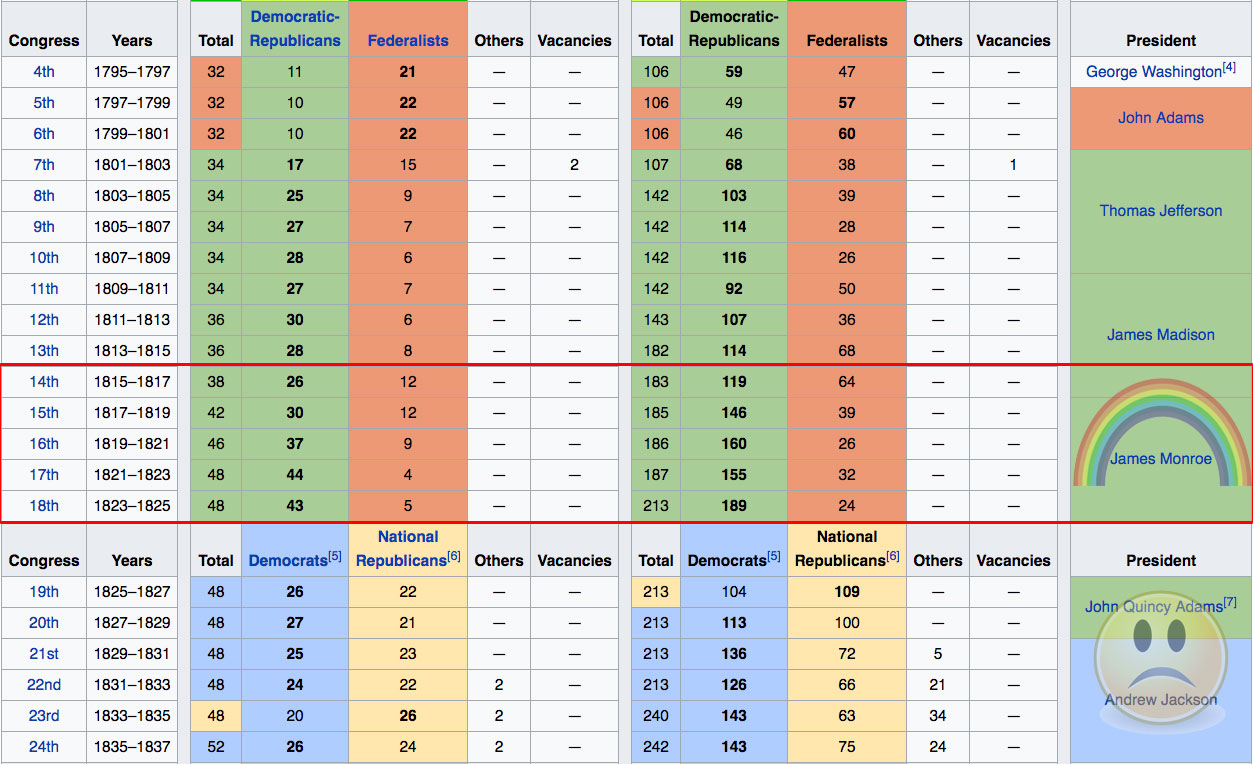Politics were divisive since day 1, as evidenced by the Federalists and Anti-Federalists, but for a few brief moments we nearly had a one party system, in these Eras of Good Feelings both Washington and Monroe ran unopposed and were elected unanimously for all intents and purposes.
George Washington and James Monroe Both Ran For President Unopposed fact

Single Party Politics and the Era of Good Feelings
Today politics can seem divisive, with 2016 being neck-and-neck between bitter factions both in the primaries and general but it wasn’t always this way (well, it wasn’t this way for 3 elections and a few brief periods in the late 1700’s and early 1800’s at least; we explain).[1]
Did Washington and Monroe Really Run Without Opposition?
George Washington ran without any serious opposition in 1789 and 1792, and James Monroe was re-elected without serious opposition in 1820. Thus, we can say “they ran unopposed” and be mostly correct. More accurately they ran mostly unopposed and were elected almost unanimously by electors (not popular vote).[2][3]
In both cases, ironically or not, they ran formally against a Federalist named John Adams. Washington was opposed by the founding father John Adams, and Monroe by Adams’ son John Quincy Adams.
The details of these unopposed elections resulted from these factors.
- George Washington was our First President, and the country needed a strong leader more than a divisive election. Electors voted for a President and Vice President but didn’t distinguish between them, so what looks like votes for Adams and Clinton (oh how things change, right?) are votes for Vice President. In both 1789 and 1792 Washington is considered to have run unopposed.
- Thomas Jefferson was so popular that his Democratic-Republicans nearly unified our country. This United Era, under “the Virginian dynasty and “Republican Generation” was known as the Era of Good Feelings. This was true under Jefferson, Madison, and then Monroe. Monroe specifically was not only popular but was favored as the country looked to him for guidance on coping with the depression following the Panic of 1819, new issues of expansion, and the related issue of slavery.
FACT: John Quincy Adams technically ran and got one single vote in 1820. We live in a republic, so the electoral college elects Presidents and Vice Presidents. They are not elected directly by the people. No one knows who the elector is as ballots are cast in private but the chances that their last name was Adams could be high. The Federalists tried to run Richard Stockton for Vice President, although he lost too.
The 1820 Election Explained.This Era of Good Feelings ended abruptly as modern politics began. After Monroe, the Henry Clay and John Quincy Adams vs. Martin Van Buren and Andrew Jackson election of 1824 and 1828 begin a heated war of propaganda and party politics that continues to this day. FDR, Eisenhower, Nixon, and Reagan all had very strong support compared to modern Presidents, and this fact is worth noting here.
APUSH Review: Federalists and Democratic-Republicans. APUSH Review: The Era of Good Feelings.FACT: Monroe and his VP John Quincy Adams famously created the Monroe doctrine.
FACT: George Clinton and John Adams both got a lot of electoral votes in 1792, but remember what seems like “competition” is historically considered votes for Vice President. Those votes were not tallied separately.
FACT: The Adams’ and Henry Clay are the spiritual founders of the Whigs and Republicans. Washington was from Virginia like Jefferson, Madison, and Monroe, and thus they, along with Jackson and Van Buren, are in many ways the spiritual fathers of the Democratic party. One needs to realize that the parties switched platforms over time to understand why the Democrats were the party of the south for the first part of American history. Reconstruction and the Gilded Age are part of that story as are William Jennings Bryan, the Roosevelts, and the rise of progressivism, as well as the effect of Communism on the Republican party following the World Wars. These factors completely changed American politics.
The 1824 Election Explained. Wait, where did all the “good feelings” go!? The 1828 Election Explained. Oh, the “good feelings” “went south”… welcome to the rest of American history. So much for Virginia being the moral center of the universe. Imagine if the Virginians didn’t go all Jacksonian and then states’ rights Confederate, who knows what type of Utopia we would live in?! Certainly, we can’t omit the vices of the Federalists and virtues of the Anti-Federalists from the story. However, it was long thought that slavery was immoral and against liberalism. Locke and Montesquieu, who I KNOW the founders read, made this argument clearly. It is the topic of our page “did the founders support slavery?“